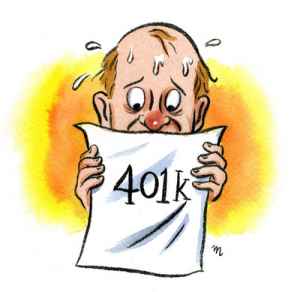- MENU
- HOME
- SEARCH
- WORLD
- MAIN
- AFRICA
- ASIA
- BALKANS
- EUROPE
- LATIN AMERICA
- MIDDLE EAST
- United Kingdom
- United States
- Argentina
- Australia
- Austria
- Benelux
- Brazil
- Canada
- China
- France
- Germany
- Greece
- Hungary
- India
- Indonesia
- Ireland
- Israel
- Italy
- Japan
- Korea
- Mexico
- New Zealand
- Pakistan
- Philippines
- Poland
- Russia
- South Africa
- Spain
- Taiwan
- Turkey
- USA
- BUSINESS
- WEALTH
- STOCKS
- TECH
- HEALTH
- LIFESTYLE
- ENTERTAINMENT
- SPORTS
- RSS
- Investing
Investors Near Retirement Age Face Big Challenges Recouping From the Crash
Mark Miller - Retire Smart

New data shows just how steep a climb older investors face in attempting to recover from the market crash
It appears that younger retirement investors are faring much better than those near retirement age in bouncing back from last year's market crash.
According to Mercer, the benefits consulting firm, investors under the age of 30 participating in defined contribution plans -- mainly 401(k) accounts -- are seeing their portfolios bounce back at a much faster rate than over-55 investors who are near retirement.
Mercer, which manages many employer plans, analyzed its defined contribution data for participants under 30, and those over 55 from the end of 2007 through April 30, 2009.
Participants under age 30 saw their accounts gain 24 percent during that time, while those 55 and over lost an average of 16 percent.
"This generally can be attributed to the fact that younger participants with smaller balances can more quickly recover their losses through new contributions and potentially a more aggressive investment strategy," Mercer stated. "In contrast, near retirees face a huge challenge in accumulating adequate savings for retirement in the midst of recent economic volatility."
Mercer's data shows that older investors pulled back from the market in a couple of ways that contributed to the performance gap. They cut back on pre-tax contribution rates from 9.2 percent in September 2008 to 8.8 percent in April 2009. And, they turned much more conservative with their holdings.
The percentage of portfolios held in capital preservation assets by older investors rose from 30 to 39 percent during the period Mercer studied -- much higher than the percentages generally held in target fund allocations for this group.
Mercer also calculated the additional amounts older investors would have to contribute to catch up -- assuming the market cooperates. But the big picture here -- acknowledged by Mercer and many others -- is that there are no easy answers, and that decimated retirement portfolios will be a major factor driving people to consider working longer in the years ahead.
The threads of the retirement safety net -- savings, pensions, health benefits, housing -- are fraying badly just at the time when we need it to support a population experiencing growing longevity.
Defined benefit plans have been a major disappointment
The market collapse has erased 30 to 40 percent of most savers' portfolios -- but the rate of employee participation is just as big a problem. Only about half of American workers contribute to defined contribution plans. For some, it's inertia, while others work for employers who don't offer plans.
As a result, 401(k) accounts simply aren't getting the job done for too many Americans
The Employee Benefits Research Institute reports that more than half of Americans have saved less than $25,000 for retirement, excluding the value of their primary home; and 20 percent have saved less than $1,000.
How big a boost can you get from working longer? Financial planners at T. Rowe Price have used Monte Carlo simulations to run some illustrations that make the point -- convincingly -- that this can be a very important way to improve your chances for long-term retirement security.
Staying on the job just an additional four years beyond your planned retirement age can boost income by about 7 percent annually, if you contribute 15 percent of pre-tax income to your portfolio during those years. At the end of those years, annual retirement income would be improved 22 percent, the T. Rowe Price analysis shows.
Waiting longer to take Social Security benefits can yield a similar boost to retirement income, since the government's payout formulas offer a significant increase in payouts for every year you wait to file past age 62, when you first become eligible. That really starts to add up in the out years.
"Delaying three years, from age 62 to 65, results in a 27 percent increase in the purchasing power of a retiree's Social Security benefits," says Christine Fahlund, a senior financial planner at T. Rowe Price.
"At age 70, it would almost double that purchasing power."
Investors Near Retirement Age Face Big Challenges Recouping From the Crash | Retire Smart
© U.S. News & World Report
CAREERS | INVESTING | PERSONAL FINANCE | REAL ESTATE